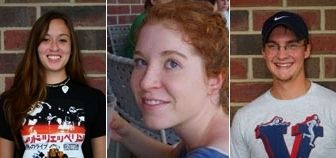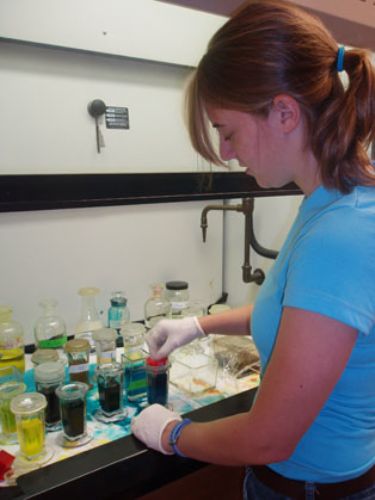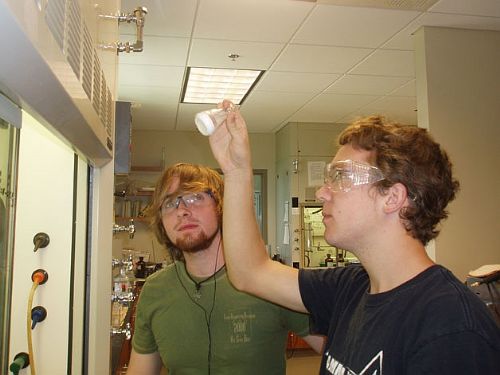DePauw's Science Research Fellows Find Success in Planning Their Futures
December 5, 2008
DePauw University has been preparing students for future careers in science for many years, but a recent trio of Goldwater Scholars—the most from any liberal arts college—show that our students are able to accomplish great things even before they graduate.
Nicole Stone '09, Kathleen Mittendorf '10, and Alex Breitinger '09 (pictured below) recently received Goldwater Scholarships, presented to students based on merit in science, and considered the most prestigious award of its kind at the undergraduate level. The story of how they've arrived at this accomplishment follows a path of opportunities made available to them through the SRF program.
 When Breitinger, a double major in history and chemistry, was looking at colleges, his decision came down to Washington University in St. Louis and DePauw. A scholarship offer from DePauw and the university's SRF program helped to sway him towards Greencastle.
When Breitinger, a double major in history and chemistry, was looking at colleges, his decision came down to Washington University in St. Louis and DePauw. A scholarship offer from DePauw and the university's SRF program helped to sway him towards Greencastle.
“At the time, I said 'Well I like them both, but DePauw is a lot cheaper.' In retrospect, I made absolutely the right decision. I've been able to do things here that I don't think would be available at even a slightly larger school."
Mittendorf, who was nominated by the university for the award as a sophomore, has a similar story.
"SRF has been such a great opportunity for me and was the major reason I came to DePauw. I had a similar scholarship offer at University of Evansville, which is closer to my home, but my acceptance to the SRF program influenced me to choose DePauw instead. I think the SRF program was a crucial addition to my application. One of the important considerations for the Goldwater Scholarship is the student's participation in research. SRF facilitates these undergraduate research opportunities in the first year."
 Members of SRF are introduced to research as soon as they enter the program. Small groups of 4-5 students assist faculty members—not graduate students—in research during their first semester in the program in areas such as neuroscience, mathematics, and kinesiology. After they hone their skills in class, students are then paired with a faculty member to prepare for a summer research project in an area of their choosing.
Members of SRF are introduced to research as soon as they enter the program. Small groups of 4-5 students assist faculty members—not graduate students—in research during their first semester in the program in areas such as neuroscience, mathematics, and kinesiology. After they hone their skills in class, students are then paired with a faculty member to prepare for a summer research project in an area of their choosing.
“I ended up with a project in geology in Tibet with [assistant professor of geosciences] Tim Cope,” says Breitinger. “He sacrificed taking a student with geology experience for my background in travel because he knew we'd be out in the middle of nowhere. It was an all-expenses-paid trip that really set up everything I've been able to achieve since.”
One of those achievements was a National Oceanic and Atmospheric Administration (NOAA) scholarship, which took Breitinger to Seattle for a summer working with hydrothermal fluid chemical analysis. During his time there, Breitinger's fellow interns gave him an idea of how DePauw stacked up against represented schools such as Rice, Vassar, Columbia and the University of Pennsylvania.
“By having those interactions with other students, I realized we really do have something special here. Going off to another country, one-on-one with a professor is something you'd never see at other places. At some of those schools, they had good situations in research or in class size, but I felt like I had stronger connection with my professors at DePauw.”
Nicole Stone might almost have been considered an SRF member even before she enrolled at DePauw. She had the opportunity to begin her research career as a student from South Putnam High School, working for two summers with Wade Hazel, Winona H. Welch Professor of Biology, on a National Science Foundation Grant. Their efforts resulted in a paper on the coloration of butterfly pupa published in the Annals of the Entomological Society of America, which Stone co-authored.
The internship component of SRF was also valuable to Stone, whose aspirations were formed in ways she hadn't considered. She spent a summer at the Rocky Mountain Biological Laboratory in Colorado, which placed her out in the wild as a field researcher. She initially thought that field work would be part of her career, but her experience that summer changed her plans.
“It was great, I loved it, but now I don't see it as a career choice,” says Stone.
Stone's internship at the Medical College of Wisconsin in Milwaukee, however, was quite different from her field work in Colorado. The majority of her time was spent in a lab researching Vaccinia virus.
“Until then I hadn't really given lab work much thought because in classes the professors know the answer and you're just trying to get to it correctly. It's better when you're working on something that has a purpose other than to get it done and get a grade. During the internship, I would lose track of the time and spend all day in the lab.”
 Learning the proper methods of research, as Stone found out, is only a small part of being prepared for a career in the sciences. Internships, the opportunity to publish, and faculty-led research give SRF students a clear view of their future, but the three Goldwater Scholars have shown what can be accomplished here and now.
Learning the proper methods of research, as Stone found out, is only a small part of being prepared for a career in the sciences. Internships, the opportunity to publish, and faculty-led research give SRF students a clear view of their future, but the three Goldwater Scholars have shown what can be accomplished here and now.
"Recognition through the Goldwater will hopefully aid my application process to graduate institutions," says Mittendorf. "A few weeks ago I was invited to a phone conference regarding the NIH-Oxford-Cambridge Scholars Program.
"I applied for the Goldwater thinking that I was honored just to receive the nomination from the university. I never expected to be selected. In fact, when I read my name on the website, I thought, 'I must be looking at a list of applicants, not winners.'"
While the SRF honors program is selective, it isn't the only option available to students interested in research. Terri Bonebright, chair of the psychology department and SRF faculty member, believes that the opportunities available to all science students at DePauw are unique.
"Our mission here is to teach. The faculty is commited to teaching and mentoring students to do what they want. [...] Some students go to graduate school, medical school, or do clinical work. The liberal arts environment teaches them to learn, and how to write and communicate so that they can be successful in any field."
Back